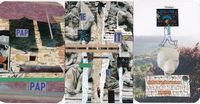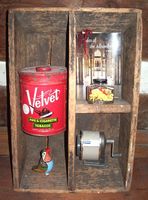On the Handmade (Part 1): Qs and a Response by Phil Hall
By Sandra Ridley
It’s been said that the hand-written letter is becoming lost to us, or that for many of us, it has already disappeared. I’ve heard too that longhand itself is no longer being taught in our schools. The physical nature of our hands is quickly adapting for work within the new digital realm. Small wonder that the word ‘digit’ experienced sematic drift; its emphasis of meaning shifted from ‘finger’ to the infinite zeros and ones of programming code. Our fingers came first; then we counted them. (Ah, but now, I’ve got your digits in my I-phone.)
There are some creators who do continue to use their hands in the scribing of words for their poems, stories, novels—and through the endangered art of hand writing letters, to be then sent off by post without certainty the words will ever reach their destination.
Letter writing is only part of the work of the rare species who create beautiful things in various forms. I say things because the realm of kinship that encompasses the mindful, intentional work seen in letter writing is essentially limitless: art postcards, small run hand-bound books, assemblages of found objects, word talismans, poem-art, collages, epistolary montages—created by one, given only to a few; sometimes not given at all. With no larger audience in mind, the connection is particularly intimate. These things are not ephemera. They’re not short-lived or transitory. They are gestures, long-held gifts, not products. In a way, the items become sacred artefacts.
I posed questions to Phil Hall, Christine McNair, and Jennifer Still, three creators who gather words, images, and tactile elements to craft works of art to be held in the hands of, or heard by, only a few people, or one, or none. Below is Phil Hall's generous response. Two posts to soon follow with Christine's and Jennifer's.
*
Qs:
Can you describe some of your work in this mode, generally speaking, without giving too much away about its private nature?
How did you come to this practice? Has it always been a part of who you are and how you engage with the world and those around you? Or is it a new experiment for you?
Do you see your creations as separate from or integrated with your larger writing practice?
Is there a freedom in creating in this way?
Your CanLit News
Subscribe to Open Book’s newsletter to get local book events, literary content, writing tips, and more in your inbox
*
A response from Phil Hall:
Tinker
For me, The Work – with materials & my hands – begins in shame (& shape).
To be a poet is shameful – our product hovers between, & has no ground.
A book is not ground, it is a puppet-show of ground.
Do not be fooled by books as monuments, I tell myself. Books fall into the bath with
you!
The pages – don’t call them “yours” – can be used for other things than reading,
propping a chair-leg’s wobble, for instance…
And what kind of gatekeeper are you – not to let your book do something else?
As if you had minted the words yourself & discovered their possible combinations all by
your lonesome!
Aren’t you just imitating everyone who is dead – to try to invent a Real self – distinct –
for your common, wayward, unsubstantiated Self?
Yes. So say: tree-skin. Page. Ding, the arm of the typewriter, used to say, its margin
some warning, some alarm. Head down, get on with it. Mucker.
If we are devoted to vowels, our poetry does not even have the narrative ground that
makes fiction seem of community.
I say I tinker. Therefore, I am the tinker – who drifts through, comes by, does not bide.
An Irish outcast. Fixes tin, that cheap & malleable metal.
But words? If I point to what I have made, I might as well point to water meeting wind
in varied light. At best, a dipper. A dipper’s shadow…
Translation, revision, archives & recitation all prove this: the Poem is merely poem-
like – & cannot reside the way a cupboard does. Whatever you put in it will be gone in
the morning. Liquid crystal.
In compensation, to invent pride instead of shame, I have had to make up
sacredness for this hand-work. I have had to align myself with other hand-works.
Had to, because my worth is in it, even if The Work is – like worth itself – only so
many passing ripples.
An insistent shame-craft then: if I had no hands, I would use my feet – the compulsion
to make something solid – is that strong…Sacred as red acres.
The push to be real in the village square (a sculpture: Rodin’s Balzac) must be resisted.
I believe Form can be (& wants to be) more of an invite than a mold.
The tinker takes his hat off, stands at the door & begs – for work – is ashamed to
beg, is invited in.
Without his urge to repair, without his hands, his slight-of-hand, the townspeople
would leak like sieves.
Watch them at their shimmering screens, or in commute, & you will know this…
I have a collage practice: scissors, glue-stick, tape, old post-cards, hand-bills, saved
scraps from other collages…a stand-up desk facing deer who eat lilacs.
In the arrangement of patterns I think I am learning about language. Outlandish.
I will make a montage of old photos, cut a frame for it out of an old school-book’s
cover – & then go back to my poem with renewed orchestration – the sequence of
sounds seems more real after I have had a tape-measure in my hand…
As a sequence develops, I cut its poem-sections up & tape them in long strips,
chains. I clip them to the door to see their emerging shapes in relation to each other,
how they hang.
Revision becomes an act of cutting the new line & gluing it over the old one.
When I stand away & read the change, I feel like a painter stepping back from an
unfinished oil – & that is a good feeling. Painters are pragmatic folk. Adults.
Is a pragmatic sonata possible? Basis Bunting thought so.
Visual work has snuck up on me gradually. It takes more confidence than a poem.
I make very small collages & self-portraits, though, analogous to poems. I wouldn’t
presume a large canvas.
What I find fresh about hand-work is that there is no metaphor. Also, a torn piece of
paper beside another torn shape is uncompromising: it either works, or it doesn’t.
This is useful to me about words in poems. Apparently, I can use any word anywhere
in a line & it will not be its meaning or syntax that determines its aptness, it will be its
proximity to the sounds & shapes around it.
Also, theory does not come into it. Oh, I’m sure there is a theory, but I don’t want to
know it. Later, maybe. Right now, I want to try another word, & be amazed that it fits.
An Outsider Art posture, then. The Postmaster, Rousseau. His flat jungles, more wild
than perspective.
And Craft as accumulated practice – ten years ago I might not have been able to
hear or trust the risk of that word’s fittingness – for me alone – this morning – in this
unstable line – among these syllables.
That sounds grandiloquent, but I don’t mean it to be – I accept error – there are mobs
of factors, & the ear’s judgments age rapidly.
This is why I rewrite the poems in my old books, perhaps ruining them in the process,
pleasing my current ear at the expense of the old dry one…
I feel indentured, with many masters. Alexander Calder. I would be a roustabout in his
wire circus.
I have come to see each hand-written word as a small drawing.
When I make a mistake – leave a letter out of a word for instance – it is obvious that I
am touching up a drawing of a word as I correct its spelling, changing the loop of an e
to a filled-in I, for instance…
Type, I’m not as comfortable with. I’m not sure who or what words typed are…As I walk
from farm to farm, the soldiers in their bright uniforms ride by & scoff at my dungerees.
Or I relate to a typed word as if each letter were not flat but really a deep mannered hole
into darkness. As if a word were a set of tiny, deep canals, each in the shape of a letter.
The canals, together, spell…
As if I were looking far down into the tiny black water of a word’s etymology, letter by
letter, I read it – a vertiginous moment, somewhat true.
Imagine being in a tiny row boat on the canal that is the little typed letter S – or better,
the deep little number 8 – for numbers have etymologies too.
Better, because there would be no dead-ends in a canal 8…
Steep sides to canal 8 or canal S – & way up there, an eye reading along…
What does reading constitute? If it is a tinker’s eye up there, the look is after a way to
help, to keep the word from leaking, say. Or to bodily know the word’s full panoply of
implications.
Here’s where it gets crazy. We are back to wind & light on water making sound, the
mad tinker, resonators in the sinuses, coliseum ribs. Eye cones. Brain matter like frog’s
eggs…
While back where the novelists & the other real artists live, none of this is tolerated:
rough Rodin has his dirty apron on. He is cutting white stone in his small disorganized
backyard in Paris, making too much real adult noise.
His dust is wafting above the alleyway, drifting toward the café…
In comparison, I am playing as if with transparent cut-outs. I am attempting to invent
a Real by using unreal, unstable materials. Roundalay, Daisy, I sing. My head is down…
My elusive materials cup sounds that connect back to the first sounds…
Singing to myself as I work…
~
That’s 25¢ for the fixed kettle.
--
Ph. Otty Lake . 2014
Triptych Montale
Before the Pencil
The views expressed in the Writer-in-Residence blogs are those held by the authors and do not necessarily reflect the views of Open Book: Toronto.
The views expressed in the Writer-in-Residence blogs are those held by the authors and do not necessarily reflect the views of Open Book.
Sandra Ridley’s first full-length collection of poetry, Fallout, won the 2010 Saskatchewan Book Award for publishing, the Alfred G. Bailey prize, and was a finalist for the Ottawa Book Award. Her second book, Post-Apothecary, was short-listed for the 2012 ReLit and Archibald Lampman Awards. Also in 2012, Ridley won the international festival Of Authors’ Battle of the Bards and was featured in The University of Toronto’s Influency Salon. Twice a finalist for the Robert Kroetsch Award for innovative poetry, Ridley is the author of two chapbooks: Rest Cure, and Lift, for which she was co-recipient of the bpNichol Chapbook Award. Her latest book is The Counting House (BookThug 2013). She lives in Ottawa.



